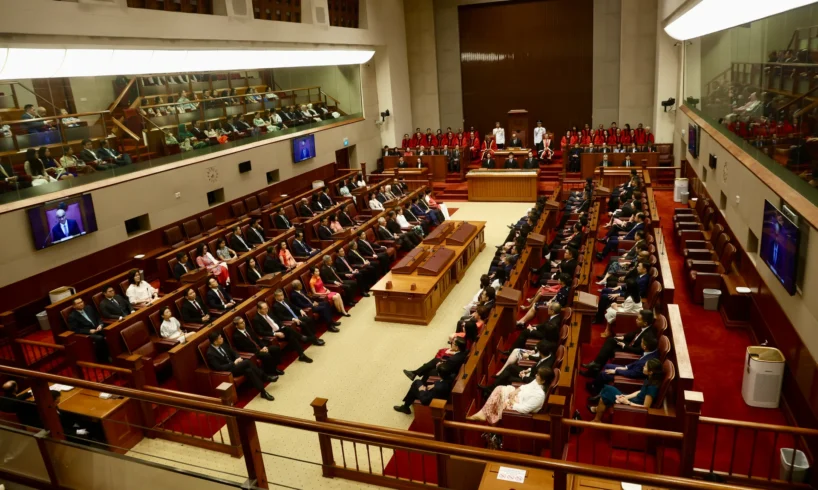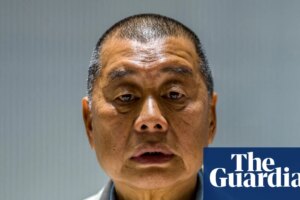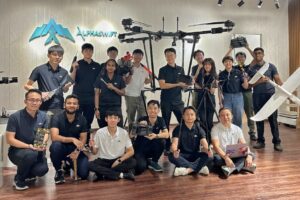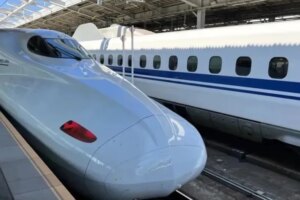
This comes as big power contestation, digital connectivity, economic weaponisation and technological advances present complex risks
[SINGAPORE] In the face of big power contestation and “economic weaponisation”, Singapore will work to identify, assess and mitigate national security risks in the new term of government, while strengthening ties with immediate neighbours and beyond.
“As Singapore’s risks and vulnerabilities evolve, so must our national security capabilities to deal with them,” said Minister-in-charge of the National Security Coordination Secretariat (NSCS) K Shanmugam on Monday (Sep 15), in NSCS’ Addendum to the President’s Address.
“Singapore faces growing and new security risks that threaten our national security and sovereignty,” noted Shanmugam, who is also coordinating minister for national security.
“Interactions between big power contestation, digital connectivity, economic weaponisation and technological advances will introduce complex risks to our infrastructure, economy and supply chains.”
He added: “Misinformation and the resultant polarisation of views could deepen societal fault lines and threaten our cohesion and stability.”
NSCS will continue to work with government agencies to identify and assess “key emerging, cross-cutting security risks” before developing solutions and coordinating responses across the whole of government.
BT in your inbox
Start and end each day with the latest news stories and analyses delivered straight to your inbox.
If digital systems in an economic sector are compromised, for example, there could be security consequences for other sectors – which is why interagency alignment and coordination is needed, he noted.
Foreign policy
Following the President’s Address at the opening of Parliament on Sep 5, the various ministries are releasing their plans for the new government term.
In a separate Addendum on Monday, Minister for Foreign Affairs Vivian Balakrishnan cited similar risks: disruptions to global trade, the weaponisation of economic tools, rising risks of conflicts, weakening multilateralism, sharper major power rivalry, and rapid technological change.
SEE ALSO
“Singapore’s foreign policy must adapt swiftly to these realities,” he said.
He outlined three priorities for the Ministry of Foreign Affairs (MFA): maintaining “consistent and pragmatic engagement with all countries”; reinforcing Singapore’s role as a credible and reliable partner; and looking after Singaporeans overseas and building domestic support for foreign policy.
First, the Republic will build closer ties with its neighbours, Asean, as well as major and middle powers.
“Despite the challenges of global governance, patient and skilful diplomacy can produce consensus outcomes.”
– Minister for Foreign Affairs Vivian Balakrishnan
Constructive cooperation with immediate neighbours Malaysia and Indonesia is vital, said Dr Balakrishnan, citing the Johor-Singapore Special Economic Zone and Singapore’s expanded framework agreements with Indonesia.
Singapore will also increase intra-Asean linkages and expand the bloc’s network of partnerships, as well as strengthen ties with the US and China, which are “important partners across many domains”.
At the same time, Singapore will expand its “circle of friends”, including middle powers in Africa, Central Asia, Latin America and the Middle East. The Republic will open new diplomatic missions in Africa and Latin America in the coming years.
It will also build on existing comprehensive strategic partnerships (CSPs) and strategic partnerships (SPs), with a CSP with New Zealand and an SP with South Korea on the cards as well.
Second, Singapore will position itself as a co-steward of the global commons, supporting rules-based multilateralism at the United Nations (UN) and the World Trade Organization. “Despite the challenges of global governance, patient and skilful diplomacy can produce consensus outcomes,” he said.
He noted that Singapore’s recent chairmanship of the UN Open-Ended Working Group on Cybersecurity established a new UN Global Mechanism on Cybersecurity.
Third, MFA will strengthen its consular capabilities and enhance its emergency response coordination to better support Singaporeans overseas.
It will also continue engaging Singaporeans on its core foreign policy considerations to build domestic support.
“National unity is essential in navigating a more contested geopolitical climate and withstanding external pressures,” he said.
Military readiness
Minister for Defence Chan Chun Sing laid out four key thrusts in his ministry’s Addendum.
The first is enhancing strategic relevance by working with like-minded countries.
The Ministry of Defence (Mindef) will deepen its relevance to existing defence partners; build and expand collaborations with new ones; and continue contributing to multilateral platforms that uphold respect for international law.
The second is staying ahead in military readiness. Chan said that the Singapore Armed Forces (SAF) will continue to evolve its operational concepts, accelerate digital transformation, and adopt technologies that serve as “force multipliers”.
New structures will be set up to drive the development of capabilities, especially in advanced cybersecurity and unmanned platforms, he added.
The third is strengthening national service.
The SAF will deploy service personnel more effectively, with refinements to the medical classification system and redesigned vocations and roles.
Finally, in building “whole-of-nation resilience”, Mindef will expand opportunities for volunteers of all ages, skill sets and backgrounds to contribute to national defence.
The ministry will also refresh its approach to national education to deepen the public’s understanding of “the changing external environment and Singapore’s fundamental realities”, he said.





